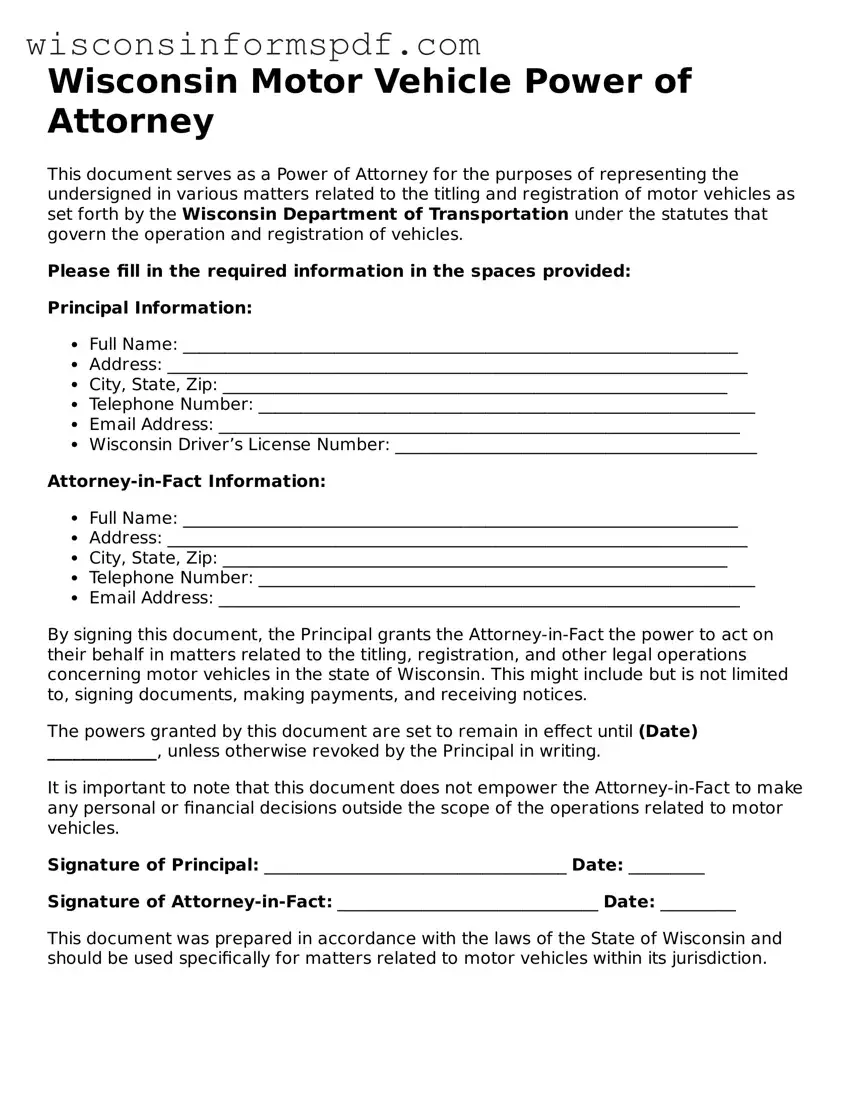What is a Wisconsin Motor Vehicle Power of Attorney form?
A Wisconsin Motor Vehicle Power of Attorney form is a legal document that allows a vehicle owner to appoint another person to act on their behalf in matters related to their vehicle. This includes handling title transfers, registrations, and other Department of Motor Vehicles (DMV) related matters.
Who can be appointed as an agent through this form?
Any competent adult can be appointed as an agent through the Wisconsin Motor Vehicle Power of Attorney form. The appointed person will have the authority to make decisions and take actions regarding the vehicle on behalf of the owner.
What responsibilities can be assigned to an agent?
Responsibilities can include but are not limited to, applying for a new title, transferring the title, registering the vehicle, and handling the necessary paperwork required by the DMV. The specific powers granted will depend on the preferences of the vehicle owner and should be clearly outlined in the form.
Do the agent's powers continue indefinitely?
No, the duration of the agent's powers can be limited by the vehicle owner. The form allows the owner to specify an expiration date for the power of attorney. If no expiration date is mentioned, the powers remain in effect until the owner revokes them, the vehicle is sold, or the owner passes away.
Is this form specific to Wisconsin?
Yes, this form is specifically designed to comply with Wisconsin law and is for use within the state only. The requirements and validity of a motor vehicle power of attorney can vary by state, so it's important to use the form that corresponds with the state where the vehicle is registered.
How can one terminate the Motor Vehicle Power of Attorney?
The vehicle owner can terminate the power of attorney at any time by providing written notice to the agent. Additionally, the power of attorney automatically terminates upon the death of the owner, the sale of the vehicle, or on the expiration date specified in the document, if any.
Does this form need to be notarized or witnessed?
While the requirements can vary, typically, the Wisconsin Motor Vehicle Power of Attorney form does need to be signed in the presence of a notary public to ensure its validity and to comply with state law. It's important to check the current requirements, as laws and regulations can change.
Can the Motor Vehicle Power of Attorney be used to sell the vehicle?
Yes, if the vehicle owner grants these specific powers to the agent in the document, the agent can handle the sale of the vehicle, including signing the title and completing the necessary paperwork on behalf of the owner.
Where should the completed and notarized form be kept?
It's recommended to keep the original completed and notarized form in a safe and secure place. Copies should be provided to the agent and any relevant parties, such as a lawyer or family member. Additionally, it might be necessary to submit a copy to the DMV or a financial institution, depending on the actions the agent is authorized to perform.

